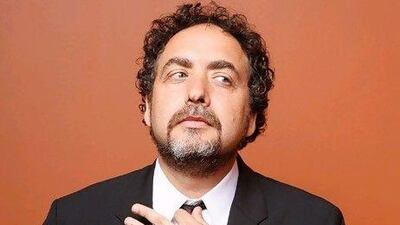There has been an increasing number of "movies about making movies" in recent years. At the last Academy Awards, two films that celebrated the film industry - The Artist and Hugo - took the lion's share of the gongs.
But few films examine movie making - in particular the making of one movie - with the intensity and detail of Room 237, the documentary from the US director Rodney Ascher, which screens today at the Abu Dhabi Film Festival.
In fairness to Room 237's subject matter, Stanley Kubrick's The Shining, it is one of the most discussed films in history, something that has been pored over by film fanatics and critics since it was released in 1980, and is now commonly regarded as a classic in the horror genre.
But Room 237, which is largely made up of footage from The Shining along with other Kubrick films, takes things in a rather unusual direction, examining some of the many conspiracy theories surrounding the film. Through interviews with a variety of The Shining scholars, each with their own take on the hidden meanings they believe Kubrick scattered across his influential masterpiece, an eye-opening journey is undertaken, one that is likely to leave most wondering what to believe. If you simply thought The Shining was a scary film to avoid on a stormy night, it's time to think again.
"I've always been a Kubrick fan and a friend of mine - who went on to be a producer of this film - forwarded me a long, incredibly deep analysis of The Shining," says Ascher, on how it all began. "It concerned astrology, cover ups, the Cold War … and I couldn't read it fast enough."
And so Room 237 was born, a small project from two Kubrick obsessives that slowly began to snowball as they scoured for more theories.
"As we started searching odd corners of the internet, we were amazed at how much stuff there was," says Ascher. "Eventually, we realised that even with a feature film, we were only going to get to the tip of the iceberg, and it took a little bit of time to find peace in that idea."
But the tip of the iceberg proves more than enough to keep most engrossed. Right from the start, the symbolic links between various scenes, background items and quotes are explained as Kubrick's reflection on the genocide committed against Native Americans. The famous blood pouring from the elevator shaft is, we're told, the blood of the Indians from the burial ground the Overlook Hotel stands on, while the carpet patterns in the lobby offer further proof of the connection.
No sooner has Room 237 ignited inquisitive eyes to this increasingly plausible theory, however, than another chapter quickly explains how the various metaphorical links dotted across the film are, in fact, referring to the Holocaust. Repeated imagery of an eagle, a German typewriter and several curious choices of dissolving from one shot to the next build up to an impressive argument.
With another filmmaker, it might be easy to cast aside the ideas as a mere combination of coincidence and someone's wild imagination. But Kubrick was a director celebrated for painstaking attention to detail.
"Kubrick was known for having spent so much time researching his movies and shooting them, having control over every element of the frame," says Ascher. "There's a lot to say that very little in his films is arbitrary, especially in the later ones."
Perhaps one of the most interesting ideas provided in Room 237 is that the film offers a metaphorical apology by Kubrick for faking the Apollo 11 moon landings. What begins as laughably implausible quickly gathers steam, with several references to space flight and Jack Torrance's repeated quarrelling with his wife about job responsibilities.
The name Room 237 refers to the film's infamous room, but also to the key with the label "Room No 237", letters than could be rearranged to say "Moon Room". Coincidence?
Room 237 is an extraordinary piece of investigatory documentary work. You might not believe all of the theories offered, but enough is laid out to suggest that The Shining isn't merely Kubrick's story of one man's descent into madness in a haunted house.
But even if Kubrick were alive to respond to this overwhelming evidence of his metaphorical mastery, it's unlikely he'd say anything.
"I've heard that when people told him what they thought of 2001: A Space Odyssey meant, he'd always listen and let them give their two cents worth," says Ascher. "But he'd never confirm or deny what they said."
Room 237 screens at Marina Mall's Vox 1 Cinema at 7.30pm tonight.

